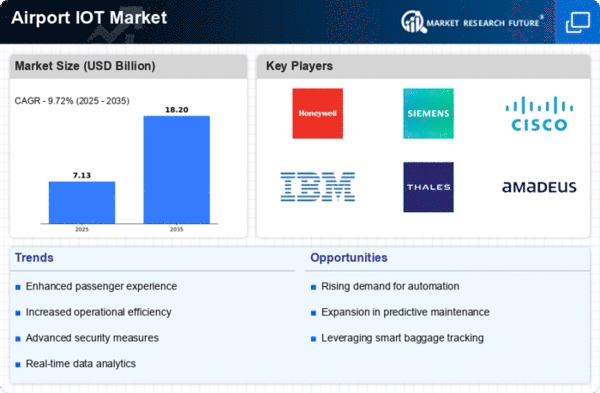Top Industry Leaders in the Airport IOT Market

The Airport Internet of Things (IoT) market is experiencing transformative growth as airports globally seek to enhance operational efficiency, passenger experience, and overall safety through the integration of IoT technologies. Key players in this market comprise established technology solution providers, airport management system developers, and companies specializing in IoT platforms, all contributing to the evolution of smart airports.
Key Players:
- Amadeus IT Group (Spain)
- Cisco Systems Inc. (US)
- Honeywell International Inc (US)
- Huawei Technologies Co. Ltd. (China)
- IBM Corporation (US)
- Microsoft Corporation (US)
- SAP SE (Germany)
- Collins Aerospace (US)
- Siemens AG (Germany)
- SITAONAIR (Switzerland)
- Wind River Systems Inc. (US)
- Accenture (US)
- Amazon Web Services Inc. (US)
Strategies Adopted: Strategies adopted by key players in the Airport IoT market revolve around innovation, strategic partnerships, and customization of IoT solutions for diverse airport requirements. Continuous investment in research and development is essential to introduce IoT technologies that enhance airport operations, including predictive maintenance, energy efficiency, and passenger flow optimization. Strategic collaborations with airport authorities, airlines, and technology partners facilitate the integration of diverse IoT components, ranging from sensors to data analytics platforms. Moreover, the customization of IoT solutions to address specific challenges, such as baggage tracking, security, and resource optimization, contributes to the market presence of leading companies.
Factors for Market Share Analysis: Market share analysis in the Airport IoT sector considers various factors, including the scalability of IoT solutions, interoperability with existing airport systems, compliance with industry standards, and the ability to address a broad spectrum of applications. The capability to provide end-to-end solutions that encompass diverse airport functions, from baggage handling to facility management, plays a significant role in determining market share. Additionally, factors such as cybersecurity measures, data privacy adherence, and the ability to adapt to emerging IoT standards contribute to the overall competitiveness of Airport IoT solution providers.
New and Emerging Companies: The Airport IoT market is witnessing the emergence of new and innovative companies focusing on niche areas such as biometric authentication, edge computing, and passenger engagement platforms. Start-ups like CrowdVision and Xovis AG are contributing to advancements in crowd monitoring and passenger flow analytics using IoT technologies. These companies often emphasize agility, adaptability, and the incorporation of cutting-edge technologies, challenging traditional players and contributing to the evolution of smart airport solutions.
Industry News: Industry news in the Airport IoT market frequently highlights successful deployments, advancements in IoT technologies, and collaborations between IoT providers and airport stakeholders. Recent developments, such as the implementation of IoT-based baggage tracking systems, the integration of biometric authentication for seamless passenger experiences, and partnerships for the development of smart airport ecosystems, showcase the industry's commitment to innovation and addressing the evolving needs of modern airports. News related to successful pilot programs, regulatory approvals, and the adoption of emerging IoT applications further shape industry perceptions and influence competitive dynamics.
Current Company Investment Trends: Investments in edge computing, artificial intelligence (AI), and data analytics remain key trends in the Airport IoT market. Key players allocate substantial resources to research and development activities aimed at enhancing IoT technologies, improving real-time data processing capabilities, and addressing emerging challenges in airport operations. Investments also focus on the development of secure and scalable IoT platforms, supporting the integration of new applications and technologies. Strategic acquisitions and partnerships contribute to expanding service portfolios, addressing emerging market needs, and strengthening the overall competitiveness of Airport IoT solution providers.
Overall Competitive Scenario: The overall competitive scenario in the Airport IoT market is marked by a balance between established technology leaders and innovative newcomers. Established players leverage their experience, global reach, and diversified portfolios to maintain a competitive edge. Simultaneously, emerging companies contribute to the market's dynamism by introducing novel applications and addressing specific challenges associated with smart airport development. The trend towards customizable and interoperable IoT solutions, incorporating AI and edge computing capabilities, further intensifies competition in this market.
Recent Development:
June 2021: Honeywell broadened its partnership with SmartSky to offer Honeywell clients top-notch and comprehensive in-flight connectivity services. Furthermore, Honeywell delivers safety solutions facilitating direct data connections between pilots and air traffic controllers through L-band satellite networks.











